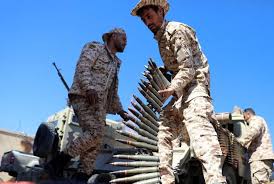Tripoli/Benghazi, Libya, April 8: Eastern Libyan forces tried to push towards the centre of Tripoli Monday after their easy desert advance hit a tougher urban phase, with deaths and displacements mounting despite Western appeals for a truce and a return to a peace plan.
Renewed war in Libya – splintered since Muammar Gaddafi’s 2011 fall – threatens to disrupt oil and gas supplies, trigger more migration to Europe, and wreck UN hopes for an election.
At least 35 people have been killed in fighting since Haftar’s forces launched their assault Thursday, Libya’s unity government said, while the UN says thousands have been displaced. The United Nations said 2,800 people had been displaced by clashes and many more could flee, though some were trapped.
PEACE MOVES IN DISARRAY: The violence has thrown into disarray a UN plan for an April 14-16 conference to plan elections as a way out of the anarchy that has gripped Libya since the Western-backed toppling of Gaddafi eight years ago.
The European Union joined the United Nations, United States and G7 bloc in calling for a ceasefire, a halt to Haftar’s advance and return to political negotiations. A contingent of U.S. forces evacuated at the weekend. The UN mission to Libya called Sunday for a truce for two hours in southern Tripoli to evacuate civilians and wounded, but it did not appear to have been heeded. Forces with the Tripoli government have announced an operation to defend the capital called “Volcano of Anger”.
TRANSIT POINT: The LNA says it has 85,000 men, but this includes soldiers paid by the central government that it hopes to inherit. Its elite force, Saiqa (Lightning), numbers some 3,500, while Haftar’s sons also have well-equipped troops, LNA sources say.
Since NATO-backed rebels ousted Gaddafi, Libya has been a transit point for hundreds of thousands of migrants trekking across the Sahara in hope of reaching Europe across the sea.
Islamic State staged some high profile attacks in Tripoli last year, but the militant group has largely retreated to the desert of southern Libya since the loss of its former stronghold in Sirte late in 2016.
France, which has close links to Haftar, said it had no prior warning of his push for Tripoli and denied it was secretly undermining the peace process, a diplomatic source said.
When President Emmanuel Macron named Le Drian his foreign minister, Paris doubled down in its support to Haftar, in close alignment with Egypt and the United Arab Emirates, which see him as a bulwark against Islamists and have supported him militarily, according to U.N. reports.
France’s stance has created tensions with Italy, which has sought to play a leading role to end the turmoil, which has allowed Islamist militants and migrant smugglers to flourish.







































